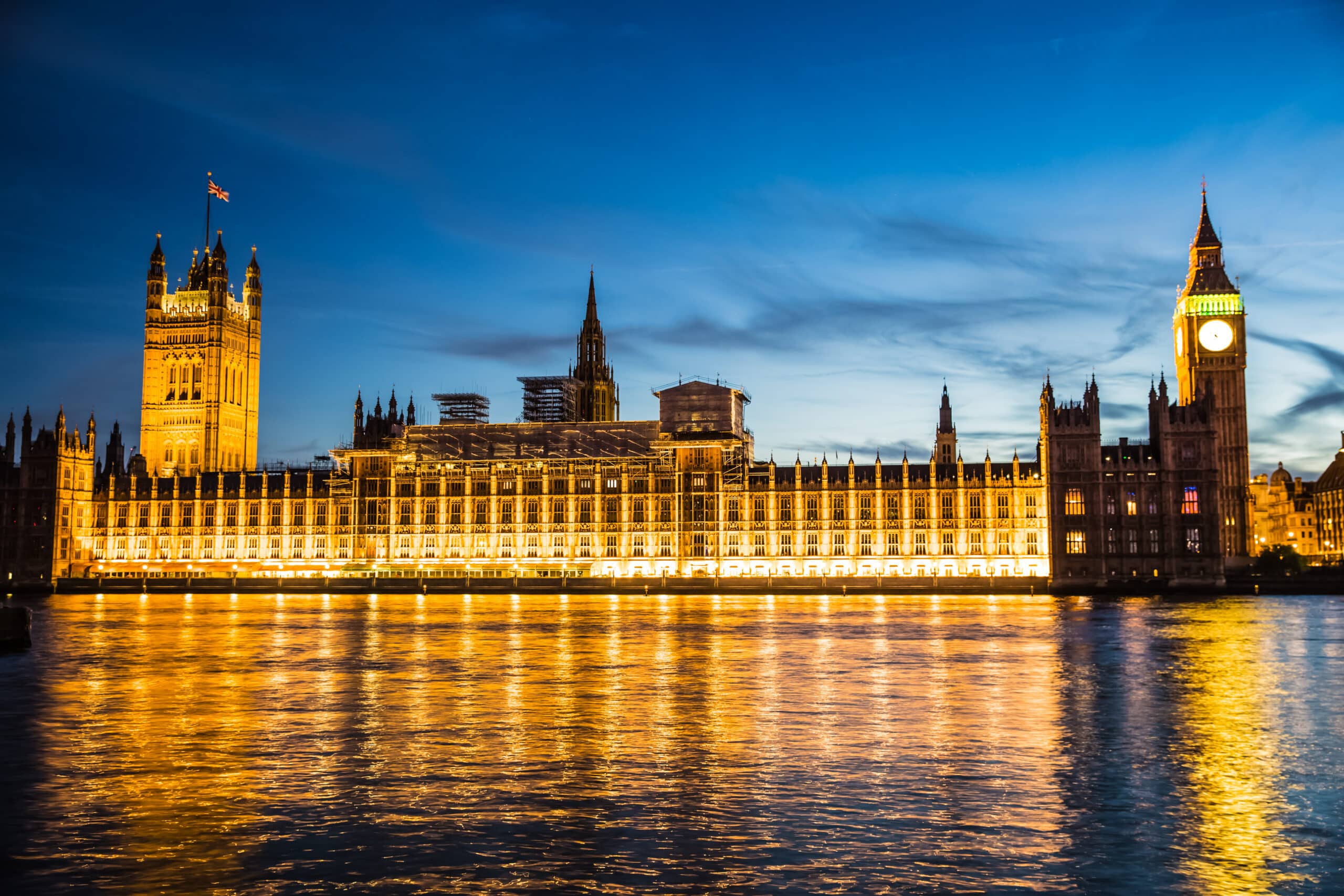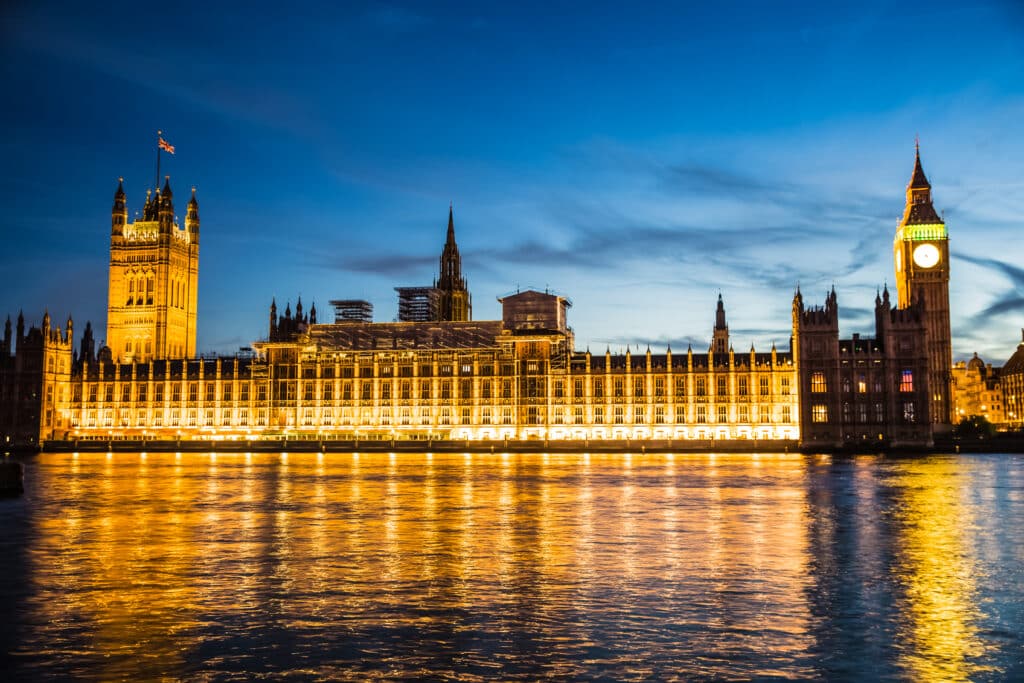How should good corporations respond to the ESG backlash?
Business Ethics Debates | read time: 7 min
Published: 15 April 2025

How should good corporations respond to the ESG backlash?
GoodCorporation’s first House of Lords debate of 2025 focused on the Environment, Social and Governance (ESG) backlash. Hosted by Baroness Kingsmill, the opening remarks were made by Steve Richards, well-known TV and radio political commenter from the Week in Westminster.
Steve Richards began the discussion by summarising the dynamics of the UK government’s current interactions with President Trump and the new US administration. He described the significant challenges it faces trying to navigate its way through this changing political landscape, not least given the UK’s serious financial constraints. He focused on the ESG challenges raised by the new US administration and how the UK government is resisting making similar changes in the UK. While noting the speed and radical nature of changes the US is making, Steve pointed out that many of the ESG issues being raised by the US administration align with the calls of populist governments and opposition parties across Europe.
Steve described the UK government’s approach to ESG matters and set out the challenges it faces as the US government radically changes its approach, in particular towards the carbon transition, DEI and the fight against corporate corruption. This politically driven backlash against environmental, social and governance (ESG) issues is having an impact on companies who now find themselves having to navigate their own paths through this shifting landscape.
The debate was then opened to the audience. The participants were asked to vote if they had made changes to corporate strategy because of the ESG backlash, or whether their policies remained unchanged. The vote created an even split and participants began the discussion on the reasons behind their different decisions.
Diverging perspectives on adapting ESG strategies
- A number of organisations in the room had a limited nexus to the US, or the US part of their business was small relative to the organisation as a whole. It was clear from these firms that they were not influenced by the ESG backlash to date and were continuing with ‘business as usual’. The bigger concern for these businesses was the potential economic slowdown and the overall drag on the economy created by this uncertainty.
- Some of these non-US focused businesses cited the problems they face in relation to unclear regulatory responses in Europe. The reduced commitment to the carbon transition is impacting some businesses with a focus on renewables. The uncertainty about emerging EU human rights legislation is similarly creating concerns.
- Companies with significant US connections, on the other hand, are experiencing a more profound challenge. A number of the businesses in the room are federal government contractors, and/or rely on federal government funding for aspects of their business. These businesses have uniformly made changes to respond to the US Executive Order which requires federal government contractors to remove DEI commitments.
- A subset of these US focused businesses is also caught by the U-turn in the US in relation to investment and support for renewables. Where they have direct interests in the US’ renewables space, there has been a rapid reconsideration of strategy and a retreat to Europe and other parts of the world, leading to considerable uncertainty about the future of current business models.
- While all companies in the room that benefit from federal government funding in the US have changed, or are changing, language about DEI, a number of companies reported that they are changing language, rather than DEI programme content in order to comply with the letter, rather than the spirit of the new Executive Order.
- Some of these federal government contractors noted that they are facing internal dissonance from their employees, both in the US and worldwide. While most employees would understand the need to keep federal government funding sources, there are tensions emerging in the US between employees who do not support the DEI changes and management who need to decide whether to formally separate their DEI positioning from that being taken in the rest of the world.
Viewing ESG pushback as temporary
- Many businesses in the room remain optimistic that the current pushback is a temporary phase and that the broader trend of ESG integration is too significant to reverse.
- The carbon transition was cited during the debate as the key area where too much had already happened to allow a swing back towards fossil fuels. Some companies are awaiting a clear government direction to allow them to determine whether investments in fossil fuel production and related activities should be retained or reinstated.
- One participant noted that the decisions to change ESG strategy would require many years to implement and therefore it was hard to see a rationale for changing strategy when the current US administration will only continue for a few years. Therefore, it is unlikely that companies will make significant investments in the US or respond to populist government requests in Europe, given the uncertainty about how long these regulatory regimes will last.
- Participants also touched on the issue of corporate values. Some companies have been criticised for changing their ESG stance (in particular in relation to DEI), having previously trumpeted this position on ESG as a key to the core values of the business.
- However, businesses noted that their first obligation is to obey the law in whatever location they operate and therefore changes had to be made. However, underlying values and attitudes would not shift so easily, so the company might have to continue with a ‘quieter’ way of expressing its values for the time-being.
- Some of those in the room commented on the risk that a change in values and any watering down of ESG commitments would have, noting the potential damage to hiring and attracting the brightest and best graduates. The risk of internal conflict was also raised.
Costs and benefits of ESG
- A number of companies indicated that the ESG backlash has led to a re-examination of the business case for ESG.
- Negative comments about the cost and benefits of ESG related reporting were raised, stating that the costs are difficult to justify when the benefits are not made clear.
- The participants were asked to comment on the push-back by the US administration towards to enforcement of the anti-corruption legislation (FCPA). None of the companies in the room had seen any change in their organisations in relation to their anti-corruption stance. Indeed, these aspects of good governance are seen as completely normal in international business and the backlash against ESG is unlikely to dislodge them.
- The carbon transition has relied on government regulation and subsidies to drive it. It is now fully established worldwide. The US pushback against renewables and in favour of fossil fuels therefore creates uncertainty. However, it was felt that the benefits of renewables and the business case for the transition remain clear.
- The delay in finalising EU human rights due diligence legislation is causing concern, and increasing the cost of compliance through continued uncertainty. Some firms noted a loss of interest from management because of these delays. Others said that legislation (in Germany, France and Norway) meant that they were continuing as planned with their human rights due diligence and management strategies.
- Some expressed the view that now was the time to reinforce commitments to ESG, saying that a clear stance would have particular benefits during this period of uncertainty.
Adjusting ESG messaging in response to the backlash
- A number of participants noted that the ‘ESG’ label may have outlived its usefulness, given the backlash. This might be the moment to move on. For instance, breaking down the ESG acronym allows for greater clarity and consistency in sustainability messaging, reduces the risk of greenwashing, and enables better measurement and reporting of environmental, social, and governance issues.
Strengthening public-private collaboration
The relationship between the public and private sectors is becoming more significant, particularly as global political instability increases.
- Businesses are looking to governments to give a clear steer in relation to ESG issues and to help create and maintain a clear and stable regulatory environment.
- However, the private sector may need to take a more proactive role in addressing sustainability and governance challenges, recognising that regulatory environments are in flux and businesses may have to adapt strategies to cope with reduced regulatory certainty.
The GoodCorporation view
This is a time of uncertainty for business. However, the broad trends are clear. The carbon transition is needed because of the significant risks for the planet in relation to the continued reliance on fossil fuels. This logic and the overwhelming data to support it, are understood worldwide. Therefore, any swing back towards fossil fuel production is likely to be temporary and the weight of worldwide legislation is clearly pushing forward renewables.
The move against the FCPA is likely to back-fire. Most global businesses know the benefits of strong governance in managing their affairs and value the certainty and clarity of resisting corruption, albeit in many markets these risks remain high. Businesses cannot seriously manage some parts of the operations where corruption is tolerated, or tacitly allowed, while maintaining codes and values that fight against corruption elsewhere. Therefore, we are likely to see all leading businesses maintain a strong stance against corruption.
DEI policies are being challenged by the US government’s Executive Order. However, the reality is that values in western societies have fundamentally shifted. It is no longer acceptable to tolerate racist, sexist or discriminatory views and it is widely expected that companies will try to build an inclusive workplace. Technology means that the planet shrinks every day, and regardless of values, this means that from a practical point of view, businesses are forced to manage diverse workforces and, importantly, they can profit when they do this well.
The push-back against human rights legislation is being driven by concerns about regulatory burden, rather than any serious view that human rights are not important. No modern business wants to make money on the back of exploitation. The key will be to ensure that legislation helps businesses to support human rights, without being overly complex or costly.
The business case for responsible business behaviour remains unambiguously clear, even if the ‘ESG’ label may be past its sell-by date. Ethics, compliance and sustainability professionals should be confident that the work they are doing is helping make their companies more profitable, sustainable and good for both planet and people.
At GoodCorporation we help our clients to design, build and embed ethics, compliance and sustainability programmes that support profitable, resilient businesses. We have over 25 years’ experience in assessing and measuring these programmes to help boards and management teams to understand how well they are doing and how they can improve. We are the measure of a good company. Contact us to find out more.
work with us

